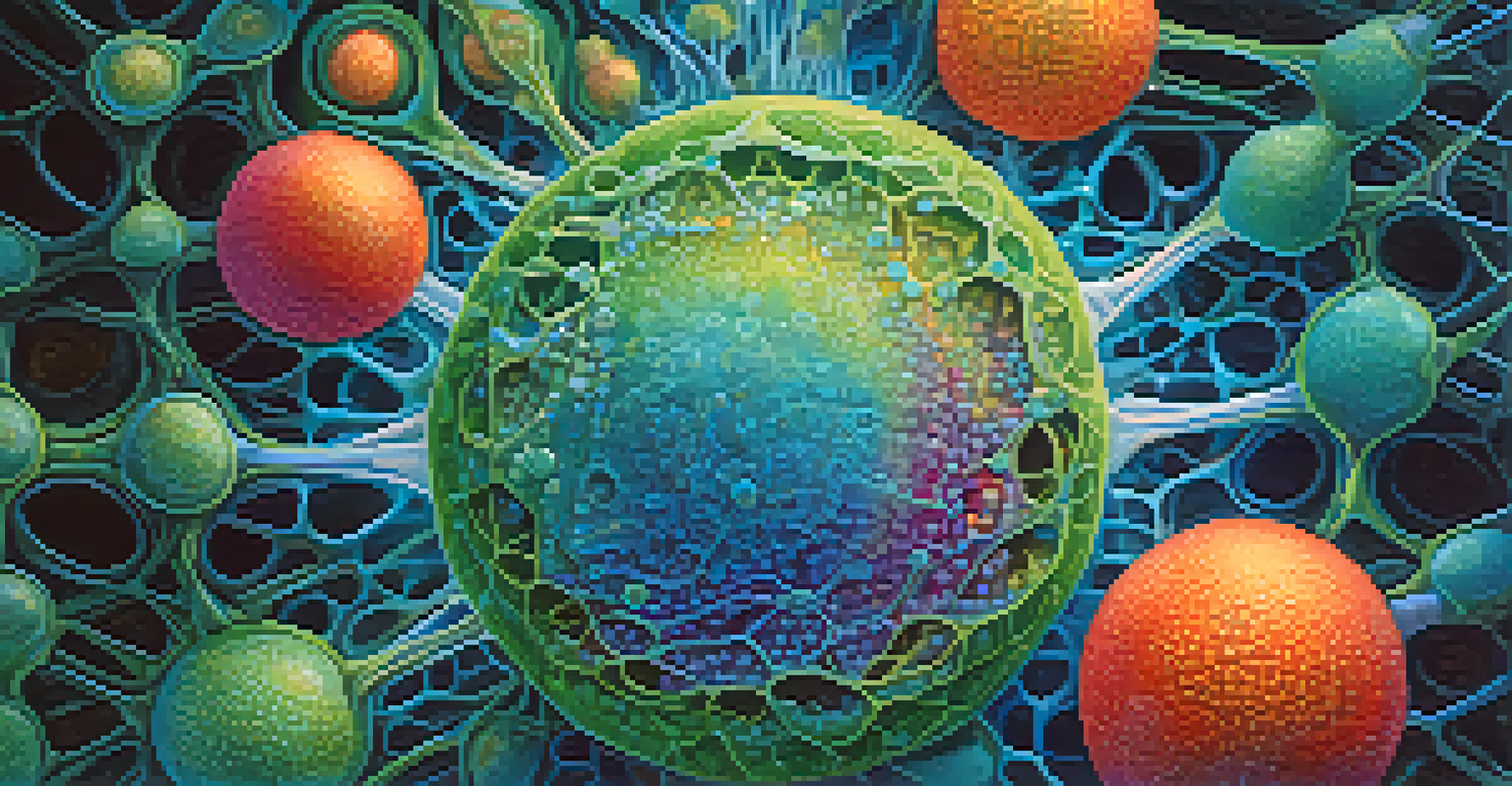Gene Therapy: A Promising Approach in Regenerative Medicine

Understanding Gene Therapy and Its Mechanisms
Gene therapy is an innovative technique that aims to treat or prevent diseases by altering the genes inside a patient's cells. This process can involve adding new genes, repairing or replacing defective ones, or even turning off problematic genes. By directly targeting the genetic root of ailments, gene therapy offers a more precise approach compared to traditional treatments.
Gene therapy has the potential to treat and prevent diseases by altering the genes inside a patient's cells.
Think of genes as the instruction manual for building and maintaining our bodies. When there’s a mistake in this manual, it can lead to various health issues. Gene therapy acts like an editor, correcting errors or providing new instructions that enable the body to function more effectively.
In recent years, advances in technology have made gene therapy more accessible and safer. Techniques such as CRISPR, a tool for editing genes, are revolutionizing how we approach genetic disorders, paving the way for breakthroughs in regenerative medicine.
The Role of Gene Therapy in Regenerative Medicine
Regenerative medicine focuses on repairing or replacing damaged cells, tissues, or organs, and gene therapy plays a crucial role in this field. By introducing healthy genes into cells, we can promote regeneration and recovery in affected areas of the body. This is particularly valuable in treating conditions that currently have no effective cure.

For instance, consider spinal cord injuries. Gene therapy has shown promise in facilitating nerve regeneration, helping patients regain movement and sensation. This application not only transforms lives but also exemplifies the potential of gene therapy in restoring function where traditional methods fall short.
Gene Therapy: A New Medical Frontier
Gene therapy offers a groundbreaking approach to treat diseases by directly targeting genetic issues, providing hope for conditions with no effective cures.
Moreover, gene therapy can enhance the body’s natural healing processes. By modifying immune cells, researchers are developing treatments that can target diseases like cancer more effectively, highlighting the dual benefit of gene therapy in both regeneration and disease management.
Current Applications of Gene Therapy
Several exciting applications of gene therapy are already making waves in the medical field. For example, treatments for genetic disorders like cystic fibrosis and muscular dystrophy are undergoing clinical trials, showing encouraging results. These therapies not only aim to manage symptoms but also seek to provide long-term solutions by targeting the underlying genetic issues.
The ability to directly address the genetic causes of diseases offers hope for patients who have long awaited effective treatments.
Additionally, gene therapy is being explored in areas like ophthalmology, where it's used to treat inherited retinal diseases. By delivering functional genes directly to the eye, patients have experienced restored vision, demonstrating the transformative potential of this approach.
It’s important to note that while the results are promising, gene therapy is still a relatively new frontier. Ongoing research and clinical trials continue to expand our understanding and refine these techniques, offering hope for even broader applications in the near future.
Challenges in Gene Therapy Development
Despite its promise, gene therapy faces several challenges that researchers must navigate. One major hurdle is ensuring the safe delivery of therapeutic genes to the right cells without causing unintended effects. This is akin to trying to deliver a package to a specific address without it getting lost or damaged along the way.
Moreover, the body’s immune response can sometimes work against gene therapy. When new genes are introduced, the immune system may recognize them as foreign invaders, leading to adverse reactions. Overcoming this obstacle requires innovative strategies to enhance tolerance and minimize side effects.
Challenges in Gene Therapy
Despite its potential, gene therapy faces challenges such as safe gene delivery, immune responses, and ethical considerations that need to be addressed.
Lastly, ethical considerations and regulatory frameworks also play a significant role in the development of gene therapies. Ensuring that these treatments are safe, effective, and accessible to all is crucial as we move forward in this exciting field.
The Future of Gene Therapy in Medicine
Looking ahead, the future of gene therapy appears bright, with ongoing advancements hinting at even more groundbreaking treatments. Researchers are optimistic about the potential for personalized medicine, where therapies can be tailored to an individual’s specific genetic makeup. This could lead to more effective treatments with fewer side effects.
As our understanding of genetics deepens, the possibilities for gene therapy expand. For instance, scientists are investigating how to use gene editing techniques to not only treat existing conditions but also to prevent diseases before they manifest.
Collaboration between researchers, clinicians, and regulatory bodies will be essential in realizing the full potential of gene therapy. Together, they can pave the way for innovative solutions that could redefine how we approach healthcare and disease management.
Patient Perspectives on Gene Therapy
Hearing from patients who have undergone gene therapy can provide invaluable insight into its impact. Many describe a sense of hope and empowerment, especially when faced with chronic or life-threatening conditions. Their stories highlight the human side of this scientific advancement, reminding us that behind every treatment is a person with aspirations and dreams.
For some, the journey to receive gene therapy can be challenging, involving rigorous testing and monitoring. However, the potential benefits often outweigh the hurdles, leading to life-changing results. Patients report improvements in quality of life, mobility, and overall health, showcasing the transformative power of this approach.
Future of Personalized Medicine
The future of gene therapy includes the exciting prospect of personalized treatments tailored to individual genetic profiles for more effective healthcare.
Listening to these experiences is crucial for shaping future research and development. By understanding patient needs and perspectives, researchers can refine therapies to be more effective and user-friendly, ensuring that gene therapy is not just a scientific breakthrough but a meaningful solution for those in need.
Conclusion: Embracing the Promise of Gene Therapy
In summary, gene therapy represents a significant leap forward in the realm of regenerative medicine. Its ability to directly address the genetic causes of diseases offers hope for patients who have long awaited effective treatments. As we continue to explore its potential, the possibilities seem limitless.
While challenges remain, the progress made thus far is encouraging. With ongoing research and dedication from the medical community, we are inching closer to a future where gene therapy could become a standard part of treatment protocols across various health conditions.

Ultimately, embracing the promise of gene therapy means not only advancing medical science but also fostering hope for countless individuals. As we navigate this exciting landscape, we can look forward to a time when gene therapy transforms lives and redefines our approach to health and healing.